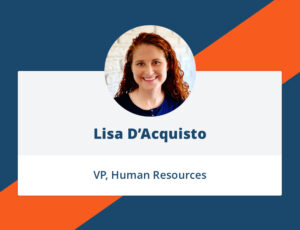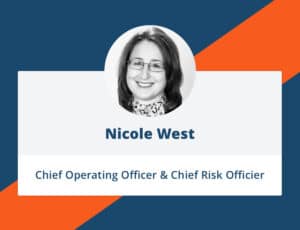How to Be Financially Confident, From Women Who’ve Been There
Categories: Blog, Celebrating Women, For College Students, For High School Students, For Students

To celebrate Women’s History Month – and Financial Literacy Month in April — we wanted to shine a light on a few successful women at Ascent and in our broader network, ask them how they’ve become financially *awesome* and to share whatever lessons they’ve learned along the way.
Lisa D’Acquisto | VP, Human Resources, Ascent

What does financial wellness mean to you?
Living comfortably within your means. This includes having enough put away in savings as well as making retirement, investments, and charitable contributions.
What’s something you’ve done for yourself — whether it be investing money or making that first big purchase independently — that has empowered you?
After college, I moved back home for two years and worked two jobs. It was a painful sacrifice. But I used this money to put a down payment on my first home at 26. Now at 42, my mortgage statement reads, “Outstanding Principal: $36,700.85”. This has empowered me because it was something I did on my own, and now I will fully own my first home in just two more short years. But more importantly, this “starter” home on 20 acres is now a safe haven for my mother to live out her retirement years. Taking care of her and not worrying about her financial struggles brings me more peace and happiness than you will ever know.
What tips or advice do you have for younger women looking to manage their money better?
First of all, know where all your money is going. Knowing is half the battle. Identify any poor spending habits. Ask yourself, “Do you really NEED it?” And if yes, do you really need it right now? Or is it just something you want?
So many people fall into the habits of instant gratification or spontaneous shopping. The majority of the time, you don’t really need it. Of course, plan for some fun treats for yourself as your budget allows but look at other ways to reduce unnecessary spending on things you don’t need and put those dollars to work. Start investing, even if it’s small. In 2008, I gave up my daily Starbucks and invested that money ($25/week) into a stock account. Seven years later (2015), that investment account had almost tripled in value (coming out of the recession helped) and paid for the down payment/closing cost for my second home.
Let me ask you, would you give up Starbucks for 7 years if it could help you purchase your next home?
Nicole West | Chief Operating Officer & Chief Risk Officer, The Analysis and Resilience Center (ARC) for Systemic Risk

What does financial wellness mean to you?
Simply it means opportunity, choice, and security. The opportunity to do what I want to do, the ability to make my own choices, and the security to know I have a safety net to take risks.
What’s something you’ve done for yourself — whether it be investing money or making that first big purchase independently — that has empowered you?
I come from a family of meager means. My parents provided a loving home, but I always felt we were living paycheck to paycheck. My parents always worked multiple jobs to make ends meet. This had a strong impact on me.
I began saving for retirement when I got my first “real” job after college at 20. I remember it was only $50 per paycheck – but it gave me a real sense that I was securing my future and watching that grow over time was extremely empowering. It put me on the path to buy my first home at 25.
What tips or advice do you have for younger women looking to manage their money better?
First. Lean in early. Think about what is important to you, have a budget, and start to save, even if it’s a small amount.
Second. Own your financial future. Learn about money, educate yourself about financial options, don’t be afraid to ask questions. This is a lifelong journey that I am still on.
Third. Be realistic. It’s okay to balance living today and planning for your future. Don’t shortchange either. Also, there are going to be down times in the market or your financial life. Don’t panic. Make educated choices. Don’t give in to fears in the moment. Things always get better.
Lauren Garner | Senior Director of Marketing, Ascent

What does financial wellness mean to you?
To me, financial wellness means being aware of my finances and feeling financially secure for where I am and where I want to be. There is a balance of spending in the present with saving for the future. There are so many options out there, so I have sought advice from financial planners and leverage calculators to map out my finances and ensure I stay on track.
What’s something you’ve done for yourself — whether it be investing money or making that first big purchase independently — that has empowered you?
I am by no means a financial expert. After getting married and purchasing my first home this year, I knew I needed help from a professional to keep my finances on track. This was the first year I worked with a financial planner and a CPA for my taxes. It surprised me how empowering it can be to leverage experts to build a plan and maximize finances. I also learned a lot in the process.
What tips or advice do you have for younger women looking to manage their money better?
If I could go back in time, my advice to my younger self out of college would be, “Ensure you have an emergency fund with enough savings to cover at least 3-6 months of expenses.” I could have averted a lot of stress and expensive credit card debt if I had chosen to put my unexpected income (like bonuses and tax refunds) into savings, instead of splurging on vacations. There is great peace of mind and freedom knowing you have cash on hand to keep you financially independent for at least three months if something major happens.
What are you waiting for? Take some time now to put financially valuable tips, like the ones above, into practice! Whether you’re just learning how to budget, or you’ve been saving for years like a pro, just remember it’s always a work in progress.
For more financial wellness tips and advice, check out our Financial Wellness resource page:


